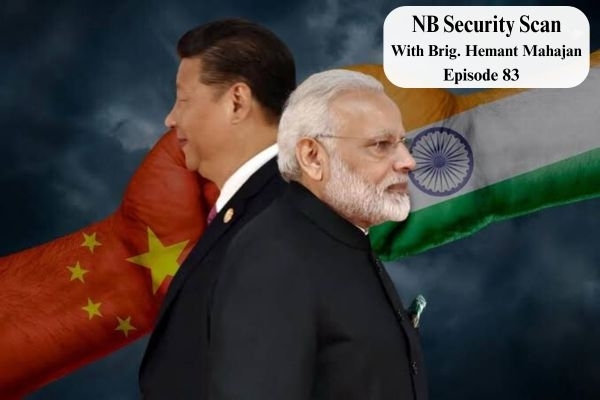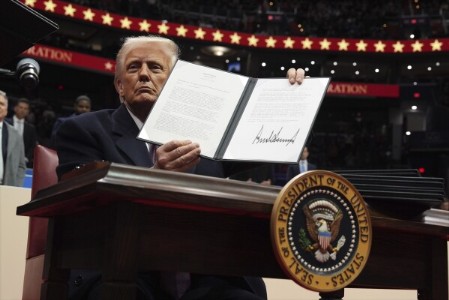#SecurityScan 83: Countering Chinese Multi Domain, Greyzone, High Breed Warfare
Total Views | 1206
This article is a summary of important events that have taken place in last one week affecting, India's national security.
News In Brief Countering Chinese Multidomain War
It Is Desolate’: China’s Glut of Unused Car Factories
Manufacturers like BYD, Tesla and Li Auto are cutting prices to move their electric cars. For gasoline-powered vehicles, the surplus of factories is even worse.

European Parliament slams Hong Kong’s jailing of EU national on security charges, calls for freeing of Jimmy Lai.
Resolution calls for freeing of Joseph John, as well as democracy activist Andy Li and newspaper publisher Jimmy Lai.Measure also condemns Hong Kong’s passage of Article 23, a domestic national security bill, and asks EU to impose sanctions on Chief Executive John Lee
New Zealand Becomes the Latest Country to Pivot to the U.S.
Beijing’s bullying tactics have pushed Wellington into Washington’s welcoming arms.
US agency FCC bars Chinese telecoms carriers from offering broadband services
The FCC has cited national security concerns in revoking or denying Chinese companies’ rights to provide US telecoms services.The agency has previously barred approvals of new equipment from China’s Huawei, ZTE and other firms.
India aims new Crystal Maze missile at Pakistan’s nukes.
Air-launched, Israel-made missile marks a shift from Russian arms and move toward a counterforce nuclear strategy vis-a-vis Pakistan.
Gaza: AI changing speed, scale and harm of modern war
Israel relying on AI-enabled decision-making systems to identify and hit targets in Gaza despite a reported 10% inaccuracy rate.
From state contracts to a dawn raid:
Europe turned off China’s Nuctech Security equipment supplier’s machines that are widely used at borders around the continent under public contracts.
Columbia-protests-antisemitism-universities-west-dark-age
We are the West’s last generation before the new Dark Age begins say the students. There is no future for our civilisation if universities’ totalitarian indoctrination of the young continues, say Jewish students.
China must stop aiding Russia if it seeks good relations with West, NATO says
China must stop supporting Russia's war in Ukraine if it wants to enjoy good relations with the West, NATO Secretary-General Jens Stoltenberg said on Thursday, warning Beijing in unusually harsh words, it cannot have it both ways.
During a visit to Berlin, the chief of the Western military alliance said Beijing's help was vital to Moscow's war effort as it was propping up Russia's war economy by sharing high-end technology like semiconductors.
China harbours ship tied to North Korea-Russia arms transfers, satellite images show.
China is providing moorage for a U.S.-sanctioned Russian cargo ship implicated in North Korean arms transfers to Russia, according to satellite images obtained by Reuters, as U.S. concerns grow over Beijing's support for Moscow's war in Ukraine.
The Russian vessel Angara, which since August 2023 has moved to Russian ports thousands of containers believed to contain North Korean munitions, has been anchored at a Chinese shipyard in eastern Zhejiang province since February.
A Chinese Firm Is America’s Favorite Drone Maker. Except in Washington.
U.S. authorities consider DJI a security threat. Congress is weighing legislation to ban it, prompting a lobbying campaign from the company, which dominates the commercial and consumer drone markets.
China concerned about Japan's plan to join AUKUS, firmly opposes countries cobbling together exclusive groupings: defense ministry
China is concerned about Japan's plan to join AUKUS and firmly opposes countries cobbling together exclusive groupings, building bilateral or multilateral military alliances targeting China, a spokesperson from China's Ministry of National Defense said on Thursday.
Submarines won’t prepare Australia for what China could do to it in a war
Australia’s new national defence strategy focuses on countering its ‘adversary’ on the battlefield, yet its true vulnerability lies elsewhere – on its economy’s heavy reliance on China.
#COUNTERING CHINESE MULTI DOMAIN , GREYZONE, HIGH BREED WARFARE
Chinese Firms Are Investing Abroad at Fastest Pace in Eight Years,Job-creating factories abroad may help allay export complaints, But China faces ‘huge suspicion’ over its investment plans
China’s overseas investment is heading for an eight-year high as its dominant firms build more factories abroad, a shift that could soften criticism of Beijing’s export drive.
Chinese companies made 243 billion yuan ($33.5 billion) in foreign direct investments from January to March, data released last week showed. That was the highest first-quarter figure since 2016 .
UK Warns Universities About Research Threat From Foreign States,UK security panel last year warned about threat posed by China
Foreign states are using UK universities to “steal advantage” by covertly acquiring British intellectual property, the government warned, saying it would explore proposals to protect cutting-edge research and technology.
After an internal review found Chinese are targeting sensitive academic work, the UK will consult on measures to protect the British higher education sector from Chinese threats, Deputy Prime Minister Oliver Dowden said late Thursday. It followed a meeting in which leaders of 24 universities — including Oxford and Cambridge — were briefed by the chiefs of the UK Security Service, MI5, and the National Cyber Security Centre.
Academics at UK universities face vetting to counter Chinese spies
MI5 review finds that national security is at risk because Chinese are attempting to steal sensitive research from British institutions.
Academics and researchers involved in cutting-edge science at British universities are to be vetted by the security services, under government plans to tackle Chinese espionage.
The director-general of MI5 has warned vice-chancellors that hostile states are actively targeting universities to steal technology that can “deliver their authoritarian, military and commercial priorities”.
It follows a secret review into vulnerabilities of the UK’s higher education sector carried out by the security services, which concluded that foreign states such as China are attempting to steal sensitive research.
How AI Could Help China Meddle in Elections
China has already won elections in two countries, Maldives and South Pacific Islands .
ChatGPT and similar AI programs give propagandists and intelligence agents a powerful new tool for interfering in politics. The clock is ticking on learning to spot this disinformation before the 2024 election.
The social media is fertile ground for AI-powered disinformation.
Elections around the world are facing an evolving threat from foreign actors, one that involves artificial intelligence.
Over the years, a number of countries – most prominently China and Iran – used social media to influence foreign elections, both in the U.S. and elsewhere in the world and 2024 will not be any different.
But there is a new element: generative AI and large language models. These have the ability to quickly and easily produce endless reams of text on any topic in any tone from any perspective.
This is all very new. ChatGPT was introduced in November 2022. The more powerful GPT-4 was released in March 2023. Other language and image production AIs are around the same age.
A CONJUNCTION OF ELECTIONS
Election season will soon be in full swing in much of the democratic world. Seventy-one percent of people living in democracies will vote in a national election between now and the end of next year. Among them: Argentina and Poland in October, Taiwan in January, Indonesia in February, India in April, the European Union and Mexico in June and the U.S. in November. Nine African democracies, including South Africa, will have elections in 2024. Australia and the U.K. don’t have fixed dates, but elections are likely to occur in 2024.
Just last month, Meta announced that it had removed 7,704 Facebook accounts, 954 Facebook pages, 15 Facebook groups and 15 Instagram accounts associated with a Chinese influence campaign, and identified hundreds more accounts on TikTok, X (formerly Twitter), LiveJournal and Blogspot.
Generative AI tools also allow for new techniques of production and distribution, such as low-level propaganda at scale. For the most part, it behaves normally. It posts about its fake everyday life, joins interest groups and comments on others’ posts, and generally behaves like a normal user. And once in a while, not very often, it says – or amplifies – something political. Democracies have to watch out all posts.
Chinese Grey Zone War Against Taiwan
Gray zone warfare refers to the use of unconventional tactics and strategies by China to achieve its objectives without resorting to direct military engagement. These tactics operate in the space between peace and war, employing a combination of diplomatic, economic, informational, and military tools to achieve desired outcomes.
Here are some strategies China has employed against Taiwan:-
Disinformation Campaigns: China has employed disinformation campaigns through various media channels to influence Taiwan's domestic politics and sow discord among Taiwan's population.
Economic coercion: China has used its economic leverage to pressure Taiwan. This includes restricting trade, tourism, and investment, as well as enticing Taiwanese businesses with economic incentives to increase their reliance on the Chinese market.
Diplomatic isolation: China seeks to diplomatically isolate Taiwan by pressuring other countries to not recognize it as a separate sovereign entity and insists on the "One China" policy.
Military coercion: China has conducted military exercises near Taiwan, increasing its military presence in the region. China conducts military exercises near Taiwan and deploy its military assets to signal its resolve and potential to use force.
Cyber operations: China has been accused of conducting cyberattacks against Taiwanese government institutions, businesses, and infrastructure. These attacks aim to disrupt Taiwan's systems and gather intelligence.
Psychological operations: China employs information warfare techniques, including disinformation campaigns, to shape public opinion in Taiwan and abroad.
Legal warfare (lawfare): China employs legal tactics and international law interpretations to challenge Taiwan's sovereignty and legitimacy on the global stage.
Proxy operations: China supports and exploits proxies, such as cybercriminals and disinformation networks, to conduct operations against Taiwan's interests covertly.
The success of these strategies is limited. While China has made progress in increasing diplomatic pressure on Taiwan and limiting its international space, Taiwan has also implemented countermeasures and garnered support from countries concerned about China's assertiveness.
Defence spending shoots up as conflicts rise globally: What it means for India and its security
India remains among the highly threatened nations. It has two hostile nuclear-armed neighbours, Pakistan and China, with the latter being the world’s second-largest military spender.
China and its threatened neighbours
China’s military rise is the most watched and analysed subject globally. The US and China’s neighbourhood, especially India, Japan, South Korea, and the Philippines, monitor all military power projection-related activities in China.
China spends around 40 per cent outside the formal military budget under other code-heads that directly contribute to military power.
All the neighbouring countries increased their defence budgets to reduce the growing military power gap with China. India also has to increase its defence preparedness accordingly.
Maryam Nawaz’s Kartarpur Sahib overture points at new Pakistani thinking on India
In an extraordinary, step, Pakistan’s Punjab chief minister (CM) Maryam Nawaz went to Kartarpur Sahib on April 18, i.e. on the occasion of Baisakhi to greet the Sikhs, especially the ‘jatha’ from India. She gave a brief speech and also joined the langar. Despite the Lok Sabha elections the Indian media took note of Maryam’s gesture. It largely interpreted it as a pointer to Pakistan wanting to normalise ties with India after the elections are over.
Maryam’s Kartarpur initiative would have no doubt been cleared by Islamabad and Rawalpindi is also indicative of their conclusion that Modi and BJP will form the government after elections.
Even while wanting an opening with India, Pakistan will look for some concessions on J&K, like restoration of its statehood. It will be important for the incoming government to carefully evaluate Pakistani intentions and ask that it ends the infrastructure of terrorism before the two countries embark on a serious engagement.
There is no indication, as yet, despite the grave challenge Pakistan faces on its western frontier with an alienated Afghan Taliban Pakistan is willing to dismantle the groups it has nurtured against India.
India’s defence budgeting and way ahead
China continues to be the world’s second-largest military spender. China’s was half of the total military spending across the Asia and Oceania region.
Chinese and Indian troops, the two largest armies by numbers, have been facing eyeball-to-eyeball on the Line of Actual Control (LAC) for nearly four years now.
Nearly 75 per cent of Capital purchases have to ‘Made-in-India’. There was a 43 per cent increase in the capital budget of the Border Roads Organisation (BRO) to build up infrastructure along LAC. The DRDO saw an increase of 9 per cent for defence Research & Development (R&D).
India needs to spend much more on R&D to have intellectual property of its own. Aero-engine, hypersonic, electronic warfare, directed energy weapons, AI, uncrewed systems, drones, robotics, quantum, long-range missiles, cyber, and space are some of the major areas. Jump-starting may not be easy.
Partnerships with friendly foreign countries are perhaps the best way. Prime Minister Narendra Modi has had one-on-one meetings with CEOs of all the top technology companies and has invited them to work with India.
Xi Warns Blinken Against ‘Vicious Competition’ Between US, China,China’s,Blinken Says US Is Prepared to Sanction More China Firms
President Xi Jinping warned America’s top diplomat that the US shouldn’t target or oppose China, as the world’s largest economies wrapped two days of talks spanning thorny disputes on trade and Beijing’s support for Russia’s war machine.
The Chinese leader met with US Secretary of State Antony Blinken in While the substance of talks was confrontational, both sides refrained from the sharpest rhetoric.
Olaf Scholz’s fruitless China trip exposes Germany’s lack of bite
The chancellor had hoped to win concessions from President Xi — but his visit just highlighted broader foreign policy weaknesses.
The plans were grand. Olaf Scholz packed his satchel for a trip to China determined to demonstrate Berlin’s cut and thrust on the global stage. In the end, it was a fruitless trip.
His failure to extract any meaningful concessions from President Xi, whom Scholz had hoped to persuade to talk sense into President Putin of Russia, followed other foreign policy setbacks and triggered an outpouring of angst at home.
Why isn’t anyone listening to Europe’s powerhouse economy, which is finally trying to do what everyone has been demanding for decades: take on a stronger role on the world stage?
States Take On China because of National Security,
States in USA have a new adversary: China.
Local politicians impatient with Washington’s actions against Beijing block Chinese land purchases, factory plans and research From Florida to Indiana and Montana, an expanding array of local proposals, bills, laws and regulations aim to block Chinese individuals and companies from acquiring land, winning contracts, working on research, setting up factories and otherwise participating in the U.S. economy.
China’s spy satellites pose threat to Taiwan, warn space chiefs
World’s second-largest economy has pumped billions of dollars into its space programme to catch up with the US and spy upon them.
China has a new fleet of spy satellites that could be used to target American and allied warships during a potential war over Taiwan, according to space chiefs from the United States.
Beijing has tripled the number of its intelligence, surveillance and reconnaissance satellites in orbit to 350 in six years as it develops military capabilities in space at a “breathtaking” speed.Beijing had used “space ¬cap¬abilities to improve the lethality, the precision and the range of [its] ter¬restrial forces”.
Some Anti-Israel Protesters Are Paid,Rockefeller and Soros grants are subsidizing those who disrupt college campuses.
Since at least the Vietnam War, exasperated observers of student protests have rolled their eyes and thought: Get a job. In some cases today, activism is a job. Two of America’s largest philanthropic foundations are behind a group that has paid some of the anti-Israel activists for the kind of antics disrupting campuses across the country.
Consider Malak Afaneh, a law student at the University of California, Berkeley, and Craig Birckhead-Morton, a senior at Yale. Ms. Afaneh went viral this month for disrupting a dinner at Dean Erwin Chemerinsky’s home. This week the Yale Daily News reported that Mr. Birckhead-Morton had been arrested for trespassing—and then re-emerged to address an anti-Israel crowd blocking an intersection in New Haven.
Banning TikTok would hit China’s tech ambitions
TikTok is facing an existential crisis in America. If its Chinese owner fails to sell the app in the next year or so, it could be banned in its biggest market.It would deal another huge blow to China’s tech ambitions.
Congress on Tuesday approved legislation that could compel ByteDance to sell TikTok or face a national ban. President Joe Biden is expected to sign the bill into law on Wednesday.
Bad News-China's share in India's industrial goods imports jump to 30% from 21% in last 15 years:
With increasing India's dependence on Chinese industrial goods like telecom, machinery and electronics, Beijing's share in New Delhi's imports of such goods rose to 30 per cent from 21 per cent in the last 15 years. The growing trade deficit with China is a cause of concern, and the strategic implications of this dependency are profound, affecting not only economic but also national security dimensions. From 2019 to 2024, India's exports to China have stagnated at around USD 16 billion annually, while imports from China have surged from USD 70.3 billion in 2018-19 to over USD 101 billion in 2023-24, resulting in a cumulative trade deficit exceeding USD 387 billion over five years.
The Indian government and industries must evaluate and potentially recalibrate their import strategies, fostering more diversified and resilient supply chains.
Water Security
Escalating Water Crisis: Reservoir Levels Plummet to Alarming Lows
Recent data released by the Central Water Commission has unveiled a harrowing reality: India is grappling with a severe water crisis, as reservoirs nationwide record a distressing decline in water levels. As of April 25th, major reservoirs are holding a mere 30 percent of their total storage capacity. This plummeting trend is exacerbated by insufficient rainfall, compounded further by the El Nino phenomenon, creating drought-like conditions across the nation. The prolonged absence of rain has drained water reserves, rendering many regions parched and perilously vulnerable.
The eastern and southern regions are bearing the brunt of this crisis, as plummeting water levels collide with relentless heatwaves. Andhra Pradesh, Karnataka, and Tamil Nadu find themselves particularly hard-hit, with water scarcity reaching critical levels. Bengaluru, in particular, is grappling with acute water shortages, profoundly impacting daily life and agricultural endeavors. The repercussions extend far beyond immediate concerns, threatening to disrupt the agricultural sector—a linchpin of India’s economy—with various crops facing dire consequences. With nearly half of India’s arable land relying on monsoon rainfall, the upcoming rainy season holds significant promise in mitigating the crisis.
Efforts to conserve water must be intensified across all sectors, spanning from households to agricultural and industrial domains. Urgent investments in water infrastructure and management systems are imperative to enhance storage and distribution efficiency. Embracing sustainable agricultural practices and diversifying crops can curtail water consumption and bolster resilience against droughts. Swift and decisive action is paramount to averting an impending catastrophe and safeguarding a secure future for all.
Bharati Web








